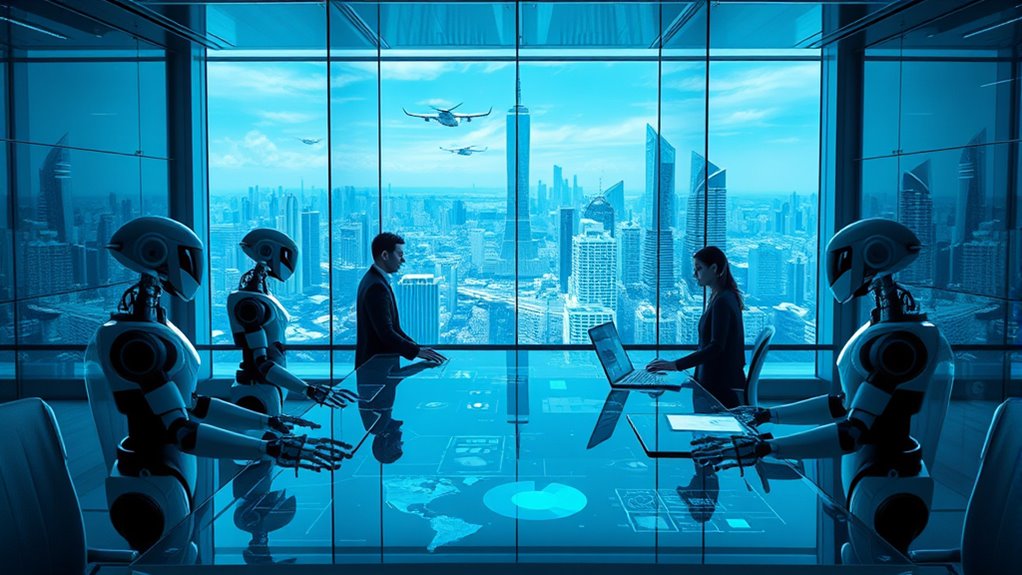Beyond chatbots, autonomous AI agents are revolutionizing the workplace by handling complex tasks, making smarter decisions, and collaborating through multi-agent systems. They automate workflows, improve efficiency, and provide real-time insights, freeing you from routine work and fostering innovation. As they evolve, these agents will reshape job roles, boost productivity, and drive economic growth. To discover how these advanced systems will transform your future work environment, keep exploring the possibilities.
Key Takeaways
- Autonomous AI agents can independently handle complex, multi-step tasks, significantly enhancing workflow automation and operational efficiency.
- They integrate advanced technologies like machine learning and real-time data analysis to adapt and optimize performance continuously.
- These agents improve decision-making accuracy and speed by analyzing large datasets and providing real-time insights.
- The adoption of autonomous agents reduces operational costs and fosters innovation across industries.
- Transparency, ethical considerations, and trust are crucial for responsible deployment and acceptance of autonomous AI in the workplace.
The Evolution From Chatbots to Autonomous AI Agents
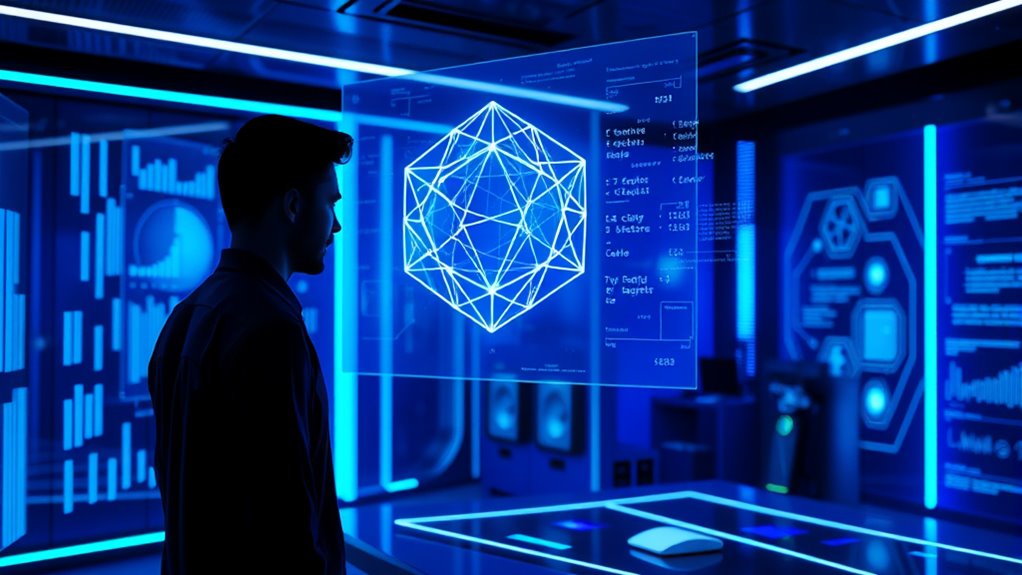
The evolution from chatbots to autonomous AI agents marks a significant leap in artificial intelligence capabilities. You’ve seen chatbots like ELIZA, which mimicked human conversation using simple pattern matching. Over time, rule-based systems like MYCIN used logic to solve specific problems. Advances in machine learning, especially reinforcement learning introduced in 1988, helped AI systems learn from data and improve. Today, autonomous AI agents can make decisions independently, understand context, and adapt to new situations. They handle complex, multi-step tasks without human intervention, transforming industries by automating workflows and increasing efficiency. This rapid progression pushes AI beyond basic interactions, enabling machines to perform sophisticated functions and paving the way for a future where autonomous agents become integral to various sectors. Additionally, understanding market research methods is crucial for developing and deploying these advanced systems effectively. As these systems evolve, ethical considerations become increasingly important to ensure responsible AI deployment and societal benefit. Moreover, integrating AI security measures is essential to safeguard these autonomous systems from cyber threats and maintain trust. Furthermore, implementing regulatory frameworks can help guide safe and ethical AI development and deployment. Recognizing the role of continuous learning in enhancing autonomous agents can further improve their adaptability and long-term performance.
How AI Agents Are Transforming Business Operations

AI agents are revolutionizing business operations by automating routine tasks, freeing up your team to focus on strategic initiatives. They also enhance decision-making with real-time data analysis, enabling faster and more accurate choices. Additionally, AI streamlines workflows, improving efficiency and reducing operational costs across various departments. AI’s cognitive automation capabilities are expanding to support increasingly complex functions, driving innovation and competitive advantage. This ongoing development allows AI to better mimic human decision-making processes, leading to more sophisticated and autonomous business solutions. The integration of automated systems is increasingly essential for companies aiming to stay competitive in dynamic markets, especially as they adapt to evolving relationship management strategies that foster stronger stakeholder connections.
Automating Routine Tasks
Automating routine tasks has become a game-changer for modern businesses, allowing them to cut costs by up to 90% and boost productivity substantially. AI agents handle complex tasks like customer service, freeing you to focus on strategic initiatives. The market for these agents is projected to reach $50 billion by 2030, driven by widespread adoption across sectors like healthcare, finance, and e-commerce. They increase efficiency by 61%, speed up task completion by 126%, and reduce errors, leading to significant workflow improvements—over 90% of companies report these gains. Nearly all employees and leaders are familiar with AI tools, reflecting rapid adoption. As a result, your organization can streamline operations, improve customer satisfaction, and cut content costs by up to 95%, transforming how routine work is managed. Market growth is driven by increasing adoption and continuous advancements in AI technology are further fueling this rapid expansion. Additionally, understanding grocery store hours can be crucial for planning efficient operational workflows and aligning staffing schedules to meet customer demand. Furthermore, AI-driven automation is transforming industries by integrating visual content creation and enhancing targeted marketing strategies, making workflows more dynamic and responsive. Incorporating software quality assurance practices ensures these automated systems maintain high standards of reliability and performance, which is essential for sustaining customer trust and operational efficiency. Recognizing the importance of dream symbols can also help businesses interpret customer feedback and employee insights more effectively, leading to better decision-making and innovation. Additionally, understanding black tea and bergamot oil in specialty beverages can inspire new product innovations that appeal to evolving consumer preferences.
Enhancing Decision-Making
Building on how AI agents streamline routine tasks, their true power lies in transforming decision-making processes within organizations. They analyze vast data sets, uncover patterns, and generate insights that enhance your strategic choices. By leveraging predictive analytics and machine learning, AI agents anticipate future outcomes and adapt strategies in real time, often outperforming humans. They operate effectively in fast-paced environments, making timely decisions based on current data, which reduces delays and improves accuracy. Data quality and security are essential for ensuring reliable and ethical AI-driven decisions. Additionally, implementing user feedback mechanisms can help refine AI performance and align outcomes with organizational goals. Moreover, integrating home improvement insights can improve operational efficiency and workplace environments. Recognizing the importance of vibrational energy in decision-making can further enhance organizational harmony and success. In sectors like finance, manufacturing, and supply chain management, these agents optimize operations and minimize risks. To succeed, you need trustworthy, timely, and contextually rich data, supported by robust infrastructure. Proper governance and monitoring ensure ethical standards are maintained as AI agents become integral to your decision-making ecosystem.
Streamlining Workflows
As businesses seek to enhance efficiency, AI agents are transforming operations by streamlining workflows and reducing manual effort. You’ll notice increased productivity, with AI handling tasks like language understanding and data analysis, boosting efficiency by 61%. Tasks get completed 126% faster when AI assists programmers, saving time and resources. Companies report up to 30% savings in customer service costs, thanks to AI-driven automation. AI agents also foster better collaboration—37% of employees say teamwork improves with their help. By automating routine tasks and integrating agentic workflows, businesses can predict delays and optimize processes in real-time. This shift allows your team to focus on strategic initiatives, ultimately making operations more agile and responsive to evolving needs. AI-powered autonomous systems are increasingly capable of analyzing large datasets and making decisions independently, further enhancing operational efficiency. Incorporating natural language processing can improve the accuracy of AI understanding and decision-making in complex scenarios. Additionally, advancements in Kia tuning demonstrate how customized modifications can optimize performance, which parallels how AI customization can enhance operational results. Furthermore, the integration of cryptocurrency acceptance in financial transactions exemplifies how digital innovations are transforming traditional workflows and expanding operational capabilities.
Key Capabilities Driving AI Agent Adoption
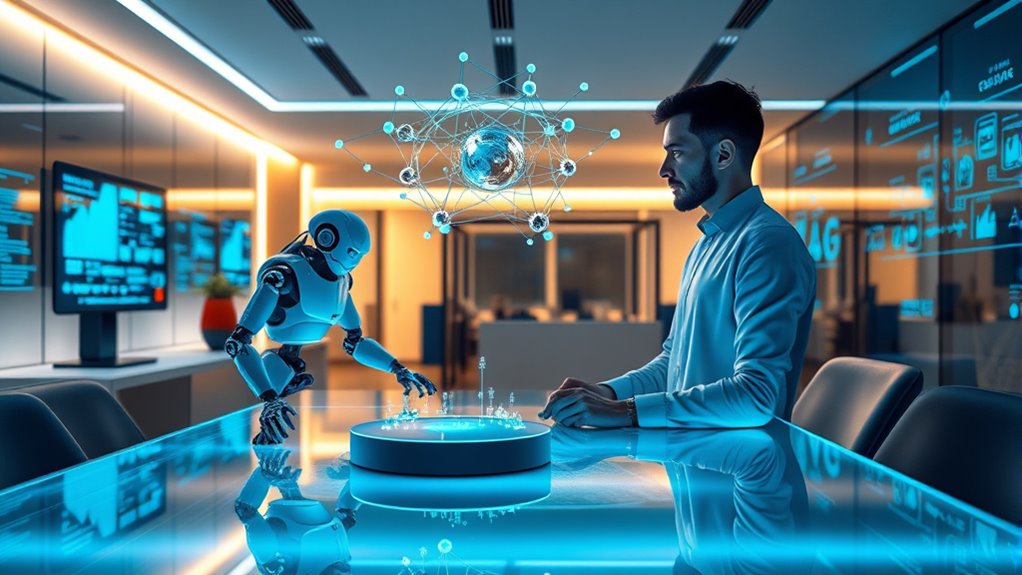
You rely on AI agents that can handle complex tasks independently, from managing workflows to making strategic decisions. These agents collaborate seamlessly with each other, combining their skills to streamline processes and improve outcomes. Their ability to learn continuously guarantees they adapt, stay current, and optimize performance over time.
Autonomous Task Handling
Autonomous task handling is transforming how AI agents operate by enabling them to perform complex, multi-step processes with minimal human input. You can rely on these agents to break down intricate tasks into manageable steps, reducing errors and operational costs. They integrate advanced technologies like machine learning, natural language processing, and real-time data analysis to execute tasks effectively. These agents can take initiative, solve problems, and make real-time adjustments to respond to changing circumstances. By automating workflows and handling multiple tasks simultaneously, they increase efficiency and accuracy. Their ability to operate independently, learn, and adapt over time ensures continuous improvement. Autonomous AI agents are capable of learning from their experiences and optimizing their actions to better serve evolving business needs. As a result, autonomous task handling boosts productivity while supporting scalable, complex operations across various industries.
Collaboration Among Agents
The ability of AI agents to work together effectively marks a significant advance in automation and productivity. Multi-agent systems (MAS) enable autonomous agents to interact, coordinate, and solve complex problems through mechanisms like negotiation and planning. These systems help avoid conflicts and redundancies, boosting efficiency. Generative AI assistants support employees by drafting documents and analyzing data, fostering better collaboration. Hierarchical agent setups allow lower-level agents to handle specific tasks while higher-level agents oversee strategy, enhancing scalability across sectors. Adaptive interfaces improve user experience by tailoring tools to individual needs. Real-world applications, such as traffic management and supply chain optimization, demonstrate how collaborative AI enhances operations. Overall, AI agents working together facilitate innovation, streamline workflows, and prepare organizations for a more integrated digital workforce.
Continuous Learning Capabilities
Continuous learning capabilities are transforming how AI agents operate by enabling them to adapt and improve in real time. You can rely on these systems to analyze ongoing data, make smarter decisions, and adjust their actions without human input. This ongoing process boosts accuracy and efficiency, allowing AI to stay relevant amid changing market conditions. Through incremental learning, models are continuously updated with new data, refining predictions and maintaining operational performance. Lifelong learning takes this further by enabling AI agents to acquire knowledge throughout their lifespan, fostering autonomous evolution and adaptability. As a result, businesses benefit from reduced costs, increased agility, and improved competitiveness. The market for these advanced AI agents is growing rapidly, driven by the need for smarter, more autonomous solutions that evolve seamlessly over time.
Economic Impact and Productivity Gains From AI Agents
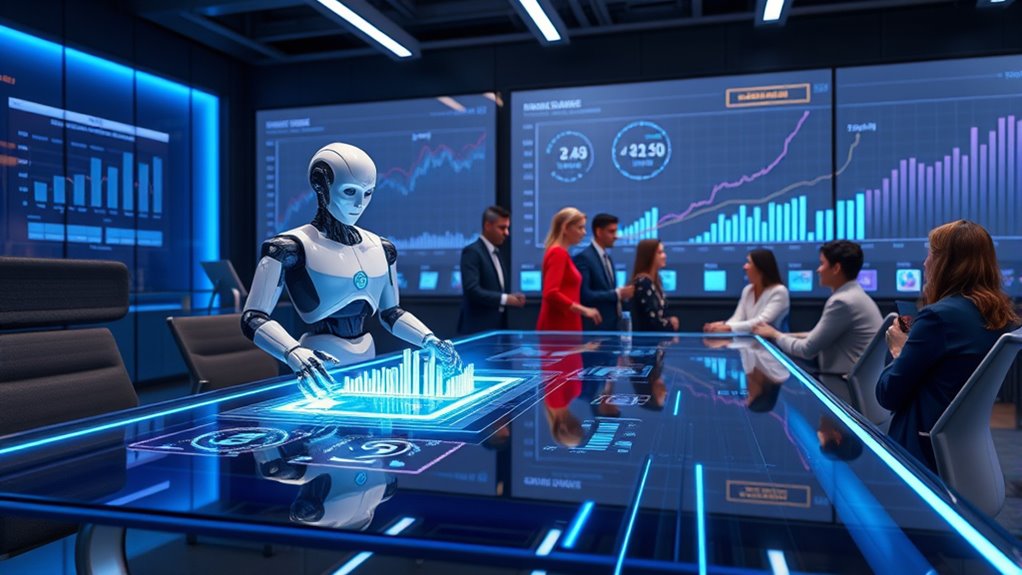
AI agents are transforming economies by markedly boosting productivity and reducing costs across multiple sectors. The market is booming, expected to grow from $7.38 billion in 2025 to $47.1 billion by 2030, with a CAGR of 44.8%. This rapid expansion drives an estimated $4.4 trillion in additional productivity, leading to a 38% increase in profitability by 2035. Industries report up to 40% savings on repair costs and streamline hiring, with 75% of resume screening optimized by AI. Healthcare, retail, and customer service sectors see significant improvements—90% of hospitals plan to adopt AI for predictive analytics, and 87% of consumers face fewer frustrations with AI-enhanced service. Overall, AI agents are projected to add $15.7 trillion to global GDP, supporting new revenue streams and higher efficiency.
Redefining Job Roles and Workforce Dynamics
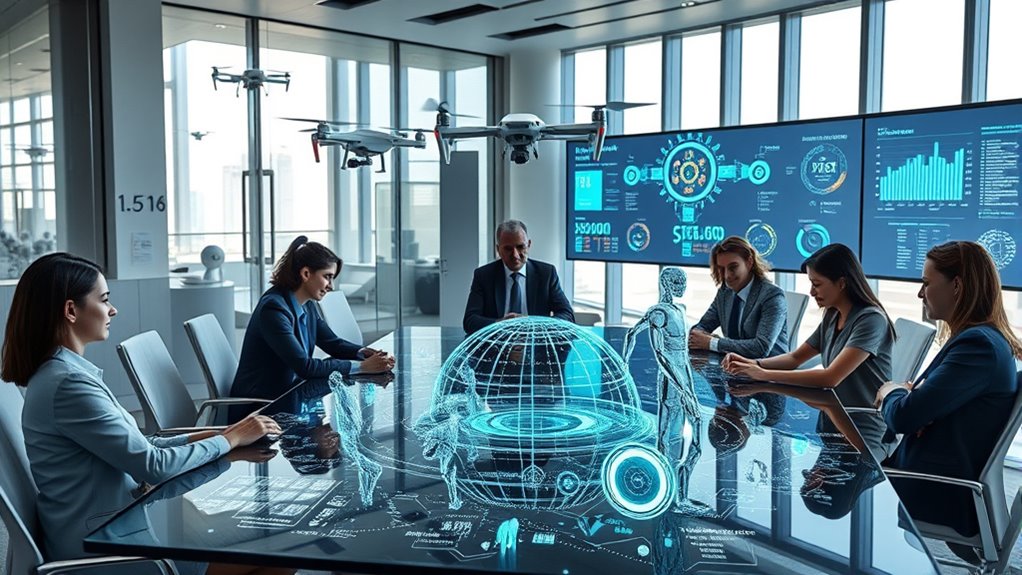
As AI agents become more integrated into the workplace, they are fundamentally reshaping job roles and workforce dynamics. About 19% of American workers face high exposure to AI, prompting a redefinition of their roles. While 30% worry about being replaced, AI also creates new opportunities, like jobs in data analysis and AI management. Tasks such as scheduling and document generation are automated, freeing you for strategic work. AI-driven training and virtual onboarding enhance skills and adaptability, making workers more secure. Companies increasingly value AI skills—96% seek candidates with them—driving workforce development. As routine tasks decline, workers must develop higher-level skills and embrace continuous learning. This shift fosters a more flexible, resilient workforce, with AI acting as a catalyst for ongoing change and evolution.
Overcoming Challenges in AI Agent Integration
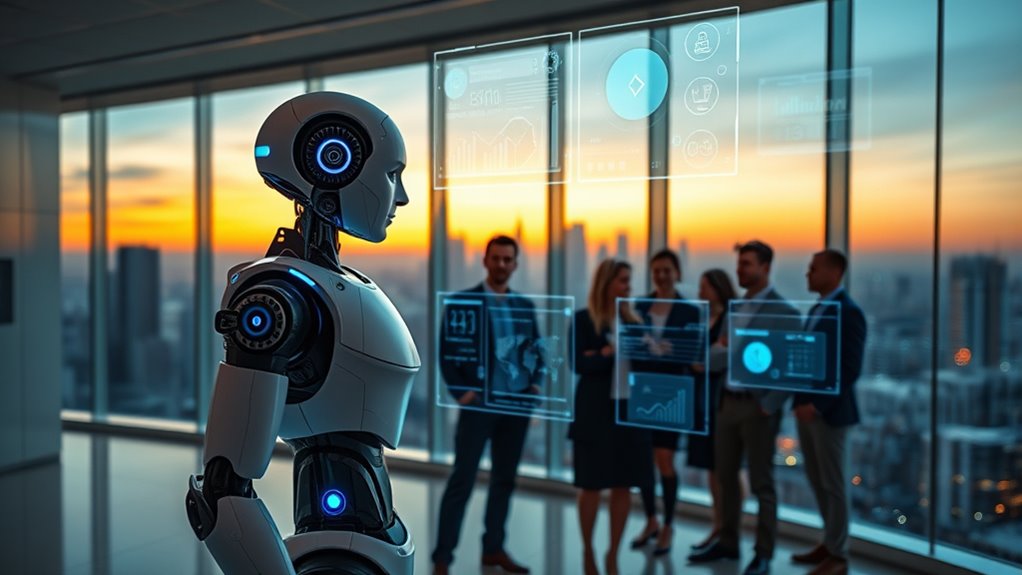
Integrating AI agents into existing workplace systems presents a range of technical and organizational hurdles. You must guarantee these agents operate reliably across complex environments, avoiding errors that could disrupt workflows. Addressing hallucinations and biases requires careful model fine-tuning and strict data quality controls to prevent misinformation and discrimination. Compatibility issues often arise when integrating with legacy systems and siloed data sources, complicating seamless data exchange. Cybersecurity remains a top concern, as AI agents accessing sensitive data increase vulnerability to hacking or breaches without strong protections. Scalability poses additional challenges, demanding significant computing resources and ongoing updates to keep pace with evolving operational needs. Overcoming these obstacles requires strategic planning, robust security measures, and continuous system evaluation to successfully embed AI agents into your organizational fabric.
Ethical and Practical Considerations for Autonomous Agents
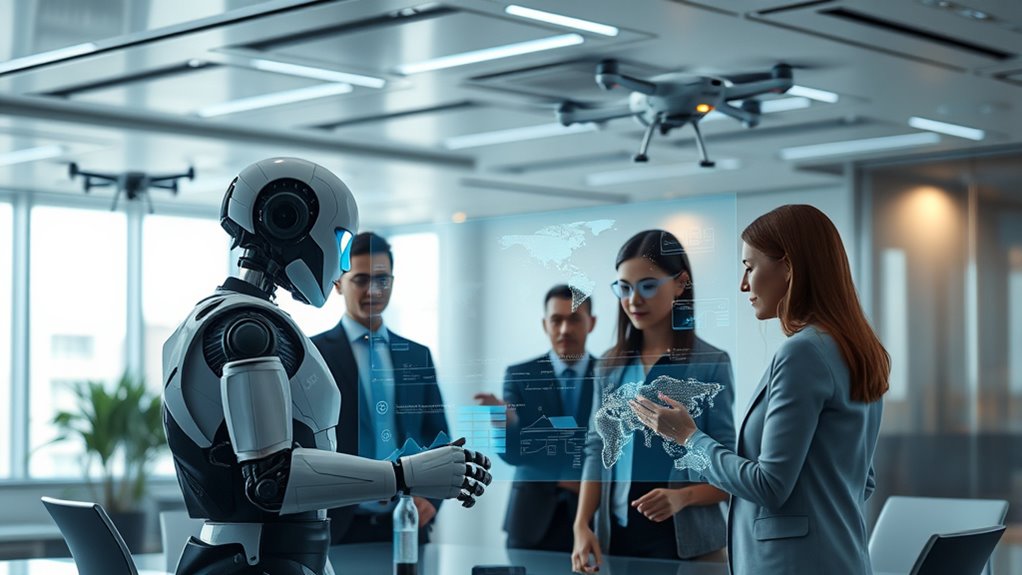
When deploying autonomous agents, ensuring transparency and explainability is essential for building trust and meeting ethical standards. You need to provide clear reasoning behind decisions, so stakeholders understand how outcomes are reached. Documentation of decision pathways should be accessible for audits, and users must be aware when interacting with AI rather than humans. This transparency fosters trust with customers, employees, and regulators. Consider these key points:
- Use interpretable AI models to ensure decisions are understandable.
- Record decision processes for accountability and review.
- Clearly inform users about AI interactions to maintain transparency.
Addressing these considerations helps you navigate ethical challenges, uphold accountability, and reinforce responsible AI deployment in dynamic environments.
Envisioning the Future of Work With Multiagent Systems

The future of work with multiagent systems promises increased flexibility, efficiency, and resilience by enabling diverse agents to collaborate seamlessly. You’ll see systems handling specialized tasks, quickly reallocating resources during disruptions, and updating components independently. Multiple agents process information simultaneously, boosting speed and accuracy, while automatically adjusting to changing conditions.
| Feature | Benefit |
|---|---|
| Task specialization | Faster responses to complex environments |
| Rapid reallocation | Minimized downtime during disruptions |
| Modular design | Easy updates without system-wide impacts |
These capabilities allow workflows to be divided efficiently, decisions to be made in parallel, and operations to scale effortlessly. As multiagent systems evolve, they’ll automate workflows, optimize resources, and redefine workplace roles, shaping a smarter, more adaptable future of work.
Frequently Asked Questions
How Do Autonomous AI Agents Ensure Data Privacy and Security?
You can guarantee data privacy and security by designing AI agents to collect only essential data, share just what’s necessary, and store information temporarily. Use secure authentication methods like API keys, encrypt communications, and operate in isolated environments. Regularly monitor activities, manage access carefully, and comply with regulations. These practices help protect sensitive info while allowing AI agents to function effectively and securely.
What Skills Will Be Needed to Manage AI Agents Effectively?
To manage AI agents effectively, you’ll need a mix of technical, strategic, and operational skills. You should master programming languages like Python or Java, understand data processing, and be familiar with machine learning frameworks. Additionally, you’ll need strategic insight to align agents with business goals, analytical skills to monitor performance, and ethical awareness to guarantee responsible AI use. Clear communication and continuous learning are crucial to adapt and optimize these agents over time.
How Quickly Can Organizations Implement AI Agents Into Existing Systems?
You can typically expect organizations to take anywhere from several months to a few years to fully implement AI agents into their existing systems. This timeline depends on your company’s size, readiness, and the complexity of your infrastructure. Many start with pilot programs, gradually expanding deployment while addressing challenges like tool limitations and security concerns. Staying flexible and patient helps guarantee smooth integration and maximizes the benefits AI can offer your organization.
What Are the Risks of Over-Reliance on Autonomous AI in Decision-Making?
Imagine walking a tightrope—you risk falling if you rely too heavily on autonomous AI. Over-reliance can lead you to lose control over decisions, making errors that clash with human values. It might also diminish your critical thinking and creativity. You could become trapped in a cycle where AI dictates choices, eroding trust and transparency. To avoid this, maintain human oversight and balance technology with personal judgment.
How Will AI Agents Impact Global Economic Inequality?
You might wonder how AI agents will affect worldwide economic inequality. They could widen gaps by boosting productivity mainly for high-income workers and firms in developed countries, leaving others behind. While some lower-skilled roles benefit, overall disparities could grow as AI accelerates wealth concentration. To prevent this, you should support policies that promote inclusive AI adoption, ensuring that the economic gains are shared more equitably across societies.
Conclusion
As you look ahead, can you imagine a workplace fully enhanced by autonomous AI agents working seamlessly alongside humans? These agents aren’t just tools—they’re reshaping how you collaborate, innovate, and thrive. Embracing this future means overcoming challenges and ethical questions, but the potential for productivity and transformation is immense. Are you ready to step into a world where AI agents become your essential partners in work? The future is now—will you seize it?
